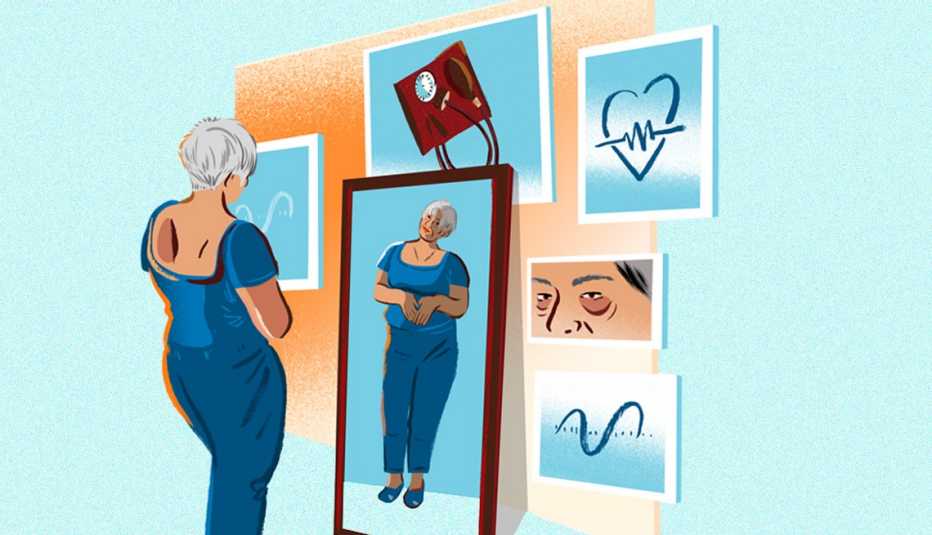AARP Hearing Center


When we were younger, staying lean was a common goal. But as we move into our 70s and beyond, we need to reassess the way we think about weight.
Of course, obesity remains a major risk factor at any age, increasing our chances of high blood pressure, diabetes, heart disease, sleep apnea, joint problems and cancer. But how we think about our weight — and the steps we take to control it — needs to be a bit more nuanced. “Losing weight” isn’t always a smart goal.
“Once you’re over 70, we worry about rapid weight loss, being underweight and sarcopenia [age-related muscle loss],” says Kristen DeCarlo, M.D., a geriatrician who practices in the areas of endocrinology, diabetes and metabolism at UI Health in Chicago. If you notice that you’re starting to drop pounds unintentionally, be aware that this downtrend may indicate muscle loss.
Some research indicates that having a bit of extra weight on you as you age may, in fact, be protective. Doctors use the BMI (body mass index) scale as one measure of body fat to determine whether you’re underweight, healthy weight, overweight or obese. (The easiest way to find your BMI: Go to aarp.org/bmi.)
In a 2022 study, researchers found that the best BMI for health in those over 65 is 31 to 32 for women and 27 to 28 for men — higher than what’s recommended for people under 65.
This is referred to as the obesity paradox, and exactly why it exists isn’t fully understood, says DeCarlo. Some studies show that people with higher BMIs in their 60s, 70s and older even had a lower dementia risk than people who were of normal weight or underweight, although why is a matter of debate. Since weight loss is a common characteristic of dementia, being thinner may simply be an indicator of the disease’s onset. That doesn’t mean ignoring your weight is OK. Quite the opposite: Paying attention to changes to your weight and body shape, as well as making a concerted effort to hold on to as much muscle as possible, can help you stay in a healthy range — so you can live well for years to come.
5 things happening to your body in your 70s
It’s not just the scale that spins differently as we get older. Other changes to our physique are taking place, says Gitanjali Srivastava, M.D., medical director of Vanderbilt Obesity Medicine at Vanderbilt University Medical Center in Nashville.
1. Muscle loss is accelerating.
“As we get older, we may become frailer,” says Srivastava. “Not doing any weight training in your 50s or 60s leads to a lot of muscle mass loss that may be more noticeable now.” By the time you reach your eighth or ninth decade, half of your muscle mass may have vanished. Nearly one-third of adults over age 70 struggle with walking, getting out of a chair or climbing stairs, according to the National Institute on Aging. Resistance training, especially exercises aimed at the larger muscle groups in the body such as the butt and thighs, can help a great deal. Try air squats: Stand with your back to a sturdy chair, with your feet shoulder-width apart and your back straight. Now bend your knees and lower your butt as if to sit on the chair. But as soon as your butt touches the seat, immediately push up using your butt and thighs to return to a standing position. (Do one set of 35 repetitions, then eventually work up to four sets of 35.) Try to do this exercise three days per week; research shows that this regimen improves lower body function in older adults.
2. You may be losing weight but gaining fat
“For reasonably healthy adults, there’s a natural increase in body fat until your 80s,” says DeCarlo. Muscle loss, plus hormonal changes and medication side effects, can contribute to you carrying around more fat than you did in your younger years.






































































More on Health
Your Weight In Your 50s: What It Means for Your Health
What those extra pounds really mean to our health and longevity — and how to deal with them effectively
Your Weight in Your 60s: What It Means for Your Health
Discover some truths about those extra pounds and six effective weight-loss strategies to start today.
Weight Loss After 50 Challenge
Learn how to lose weight and keep it off, and get delicious recipes at AARP® Staying Sharp®